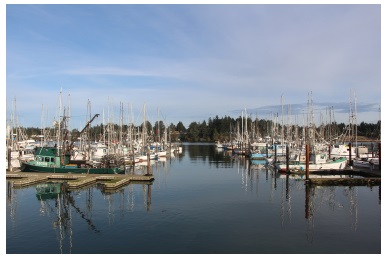Environment: Coos Bay, Corpus Christi, Oakland
![]() Print this Article | Send to Colleague
Print this Article | Send to Colleague
The Charleston Marina at the Oregon International Port of Coos Bay aced its recent Clean Marina Inspection, with a perfect score of 44 out of 44 points.
The port-owned complex includes more than 400 marina slips, a six-lane boat ramp and various fish cleaning stations and is adjacent a recreational vehicle park that the port also owns.
The Oregon State Marine Board oversees the program, which establishes benchmarks aimed at preventing pollution, reducing waste, and communicating best practices to boaters. The Oregon Clean Marina program provides guidance, for example on solid waste management, stormwater management, sewage, waste management, and abandoned and derelict vessel prevention and disposal. Charleston Marina has been a program participant since 2007.
Underscoring its commitment to responsible environmental stewardship, the port recently replaced a diesel truck with two electric carts for staff to utilize for operations and maintenance throughout the marina complex. The marina also procured LED lighting fixtures for all docks, parking areas, and buildings through the Energy Trust of Oregon. The lights are brighter, more energy efficient, and require less maintenance than conventional lighting.

Charleston Marina at the Port of Coos Bay
Photo/Oregon International Port of Coos Bay
Port Corpus Christi Earns Green Marine Certification
The Port of Corpus Christi has earned Green Marine Certification by Green Marine for its exemplary performance in environmental management and leadership.
Green Marine’s environmental program offers a template for port authorities, terminal operators, and shipping lines to voluntarily reduce their environmental footprint. The program addresses key environmental issues using up to 7 performance indicators that include reducing air emissions, minimizing community impacts, and demonstrating environmental leadership.
The certification process requires organizations to benchmark annual environmental performance, and be externally audited.
"The Port of Corpus Christi has once again demonstrated its leadership in achieving this certification in line with the port’s commitment to improving air quality, water quality, soils and sediments, wildlife habitat, and sustainability," said Sean Strawbridge, the port’s deputy executive director and chief operating officer. "A hearty congratulation to all port staff who have worked diligently to achieve this milestone."
Port of Oakland-Based Firm to Test Battery-Powered Big Rig
A Port of Oakland-based trucking operator plans to test battery-powered big rig technology here in September. GSC Logistics said it will launch a three-year trial with a heavy-duty, all-electric truck. The test is part of a statewide effort to determine the feasibility of zero-emission freight hauling.
GSC, the port’s largest motor carrier, becomes the first Northern California drayage company to test battery-powered trucks. CEO Scott Taylor said his firm would consider purchasing additional rigs if the trial is successful.
"The purpose of the demo is to prove that battery-operated trucks can work in real world applications and port operations," said Mr. Taylor. "Depending on the efficiency, reliability, productivity and economics of battery-powered trucks, GSC would certainly entertain the possibility of integrating them into our fleet in the future."
California’s Air Resources Board initiated the zero-emission truck trial last year. It’s sponsoring a test with five battery-powered rigs in Southern California concurrent with the Oakland study. BYD, a China-based company, is manufacturing the trucks.
"We’re out to prove that zero-emission, battery-powered trucks can be used in heavy-duty applications," said Andy Swanton of BYD California. He said the benefits of electric vs. diesel-powered trucks include lower operating costs, no diesel exhaust; and quieter rides for drivers and neighborhoods near truck routes.
GSC Logistics said its truck will shuttle import containers from Port of Oakland marine terminals to a nearby yard. The rig has a 100-mile battery range. The company said it would install a charging station to plug in the vehicle.
GSC, which manages a fleet of 200 trucks, hauls the equivalent of 100,000 20-foot containers of cargo annually in Northern California and Nevada. It manages a fleet of 200 trucks.
"We've done everything from subsidizing clean-truck purchases to shrinking the queues at our gates," said Richard Sinkoff, the port’s environmental programs and planning director. "Battery-powered trucks are a logical next-step for exploration."

